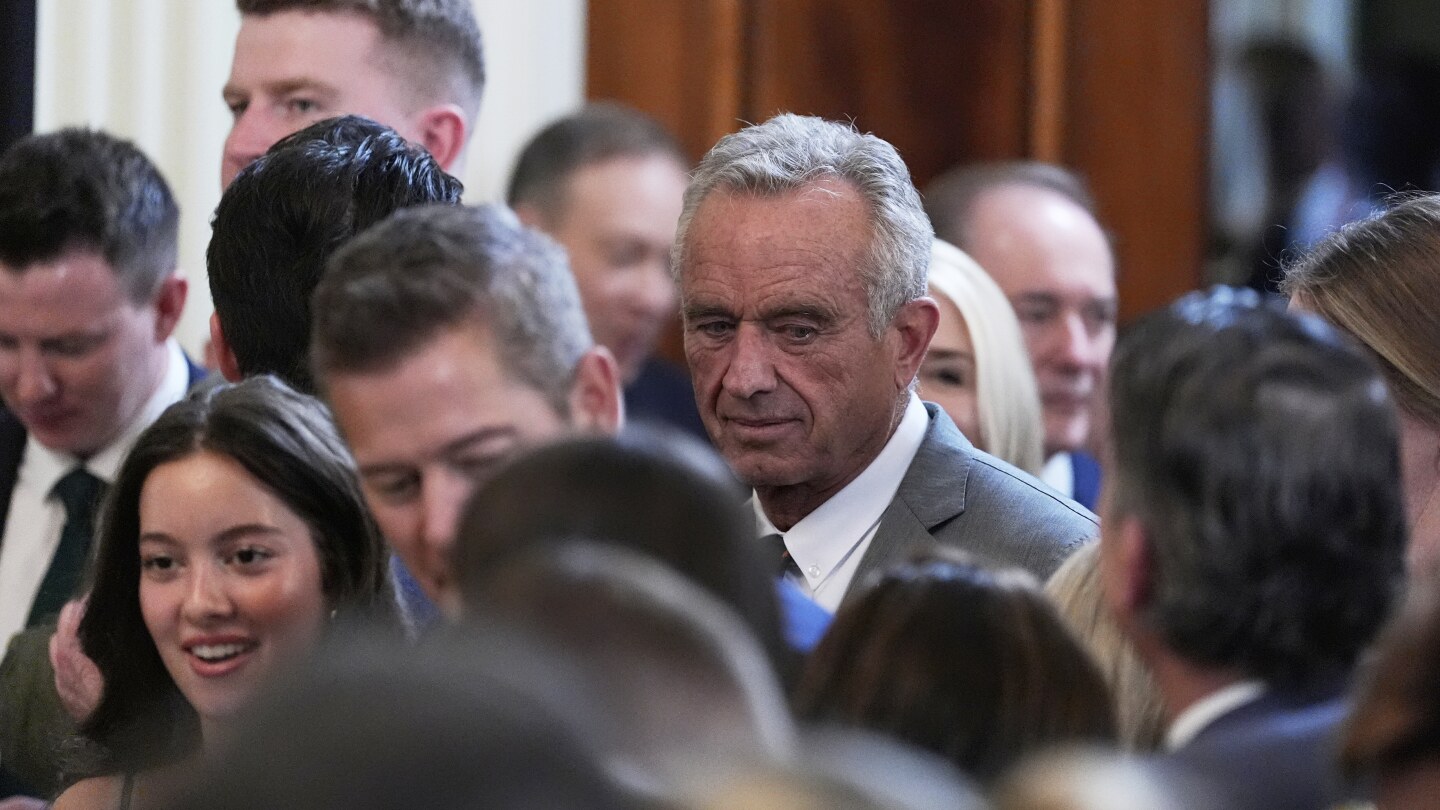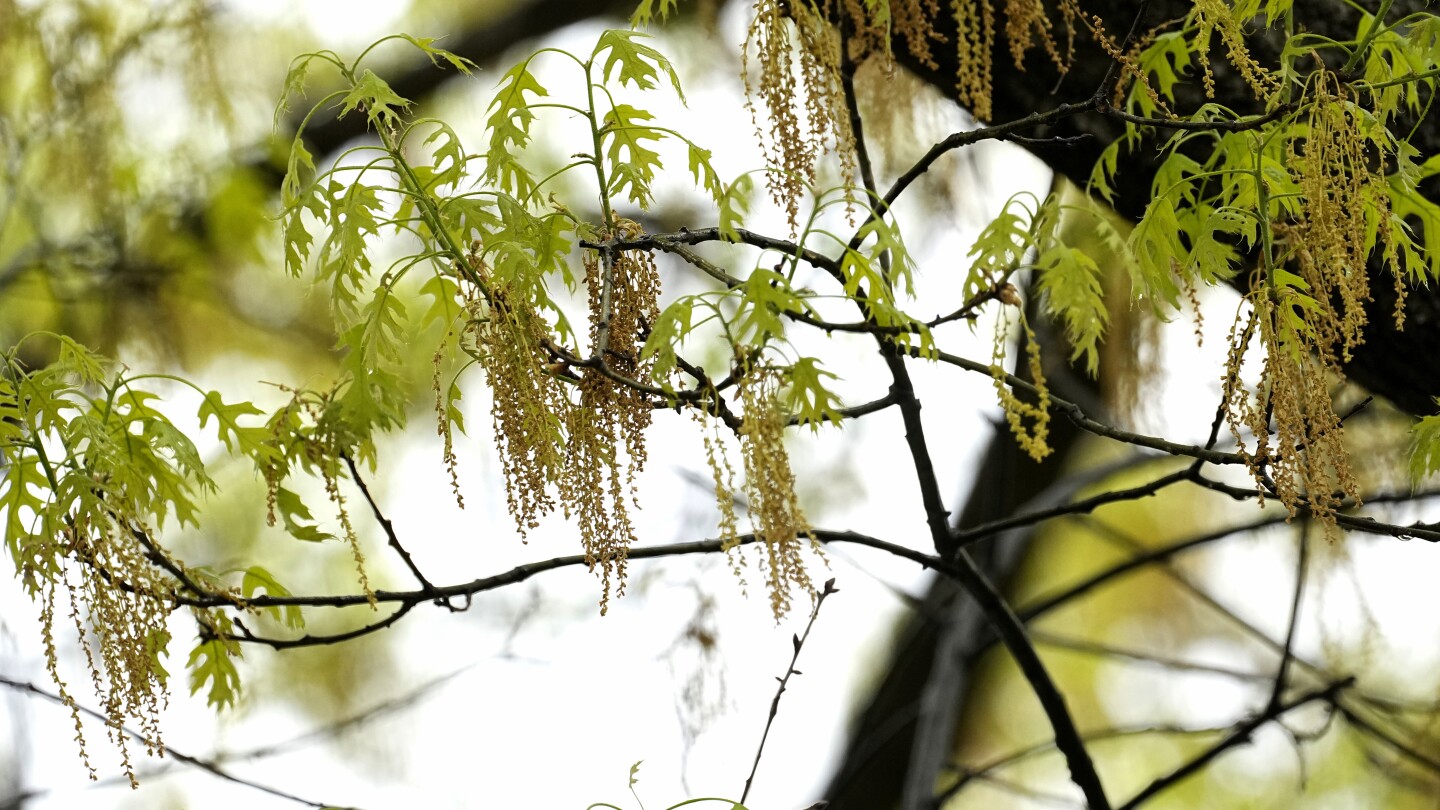Lifestyle
RFK Jr. touts french fries and casts doubt on vaccines in first month

WASHINGTON (AP) — There sat Robert F. Kennedy Jr., the nation’s top health official, at a Steak ’n Shake with Fox News host Sean Hannity, raving about the fries.
“Steak ’n Shake has been great, we’re very grateful for them,” Kennedy said, in between nibbles of fries that the Midwestern franchise recently announced would be cooked in beef tallow instead of common cooking oils that Kennedy claims — contrary to advice from nutritionists — are bad for Americans’ diet.
It’s the kind of endorsement that doctors have implored him to make about the childhood vaccines used to prevent deadly diseases, like measles as outbreaks worsened in Texas and New Mexico during his first month in office.
The secretary of Health and Human Services has, instead, raised doubts about vaccines, most recently saying in his interview with Hannity that the shots cause “deaths every year,” although he later added that vaccinations should be encouraged.
In his first month in office, Kennedy, who vowed to “Make America Healthy Again,” has delivered an inconsistent message that has the nation’s top infectious diseases specialists worried that his tepid recommendations will undermine access to long-proven, life-saving vaccines.
Public health agencies cancel vaccine meetings, research under Kennedy’s watch
During his first address to thousands of workers at the federal public health agencies, including the Centers for Disease Control and Prevention as well as the Food and Drug Administration, Kennedy promised to “investigate” the childhood vaccine schedule. Days later, the CDC canceled a public meeting of the Advisory Committee on Immunization Panel, a group of doctors and scientists who make recommendations on vaccines. That meeting has not been rescheduled.
In another case, a canceled public meeting of vaccine advisers who make recommendations on the flu vaccine every year for the FDA also has not been given a new date. This week, the National Institutes for Health, also under Kennedy’s purview, began canceling funding for some research on vaccines.
The CDC also is preparing to research autism and vaccines, planning to “leave no stone unturned in its mission to figure out what exactly is happening,” HHS spokesman Andrew Nixon said in a statement. Agency officials did not comment further for this article.
Numerous studies have concluded that there is no link between the two, a fact the agency states on its website. And studying it again could take money from other research including into finding the true cause of autism, noted Sen. Bill Cassidy, a Louisiana Republican, as he questioned National Institutes of Health director nominee Dr. Jay Bhattacharya.
When Bhattacharya suggested more studies could be worthwhile because some may believe there’s a link, Cassidy retorted: “There’s people who disagree the world is round.”
“What (Kennedy) is trying to do is scare about the safety of vaccines,” Dr. Paul Offit, an FDA vaccine adviser and infectious disease doctor at the Children’s Hospital of Philadelphia, said of Kennedy’s first month in office. “It shouldn’t surprise anybody. His agenda has always been to get vaccines off the market, or to make them less available.”
Offit worries that the cancellation of the FDA’s flu vaccine meeting, held every March for at least 30 years, is just the beginning. The committee’s June meeting to recommend the COVID-19 vaccine’s formulation has also not been scheduled, he said.
Democrats and Republicans pushed back when Dr. Marty Makary, the FDA nominee, wouldn’t commit to rescheduling the committee’s flu meeting .
“What is lost is the transparency,” said Cassidy, the Louisiana Republican who chairs the Senate health committee and is also a physician.
Kennedy rejects ‘anti-vaccine’ label but still echoes the movement
During his senate confirmation hearings earlier this year, Kennedy seemed to say he would not undermine vaccines. “I support vaccines. I support the childhood schedule,” he said. He promised Cassidy, who was unsettled about Kennedy’s anti-vaccine work, that he would not change existing vaccine recommendations.
But in the hearings he also repeatedly refused to acknowledge scientific consensus that childhood vaccines don’t cause autism and that COVID-19 vaccines saved millions of lives, and he falsely asserted the government has no good vaccine safety monitoring.
And since his confirmation, Kennedy has repeated his skeptical views of vaccines in interviews and other public statements.
He’s sent “mixed messages” on vaccine safety, even though the U.S. has “the most elaborate vaccine adverse event surveillance system in the world,” said Dr. William Schaffner, an infectious disease expert at Vanderbilt University. Serious problems, including death, are very rare and the benefits of vaccination far outweigh the risks, he said.
“A simple way to describe this to the average person is the serious adverse events generally occur at a rate of 1 to a few cases per million doses of vaccine,” he said. “That’s a needle in a haystack.”
In an opinion piece on FoxNews.com earlier this month, Kennedy said the measles outbreak in West Texas that left a six-year old child dead was a “call to action” but stopped short of recommending that people receive the vaccine that prevents 97% of cases. Despite the U.S. registering its first measles death in a decade, Kennedy has repeatedly downplayed this year’s outbreaks, noting that when he was a child “everybody got measles.”
This year’s cases — reported at 250 — are on track to far outpace last year’s reports of 286 measles infections.
Pediatricians are fielding more questions from confused parents in their exam rooms, said Dr. Susan Kressly. Worried about reports of cancelled vaccine meetings, they’re wondering about their access to next year’s flu vaccines. Others are asking if they should get doses of the Measles, Mumps and Rubella (MMR) vaccine earlier. Kressly said there’s a clear message the government can send to help stop the rising case count.
“The only way to stop an outbreak is increased coordinated positive messaging around vaccinating,” Kressly said.
The CDC has assisted with vaccination efforts in West Texas. But Kennedy himself has publicly advocated for an alternative treatment for measles: Vitamin A. Under his watch, the CDC’s guidance was updated to say that Vitamin A should be given to children with severe measles and prescribed in doses under a doctor’s supervision.
Vitamin A supplementation has been recommended for decades to reduce pneumonia and death in malnourished children in developing countries, but the benefits in well-nourished children in countries like the U.S. are less clear.
“We need to use Vitamin A for those kids who are unlucky enough to get measles,” said Dr. Andy Pavia, a pediatric infectious disease expert at the University of Utah. “But it can’t prevent measles and it can only provide some help in reducing the severity.”
When administered correctly, using Vitamin A in kids with severe measles will “do no harm,” Pavia said. But if improperly done, high doses of Vitamin A can be toxic and deadly.
Kennedy’s supporters celebrate success on the food front during first month
Abrupt staffing changes have also dominated Kennedy’s first weeks in office, with CDC pick Dave Weldon withdrawing from the nomination mere minutes before his hearing, Kennedy’s top HHS spokesman quitting two weeks into the job and the Food and Drug Administration’s newly minted chief counsel departing 48 hours into the position.
Trump and Kennedy’s supporters, however, have dismissed concerns about the rocky start.
His newfound platform as health secretary and talk of healthier foods is already affecting change in the American diet, advisers close to Kennedy and Trump have claimed on social media.
They credit Kennedy with prompting Republican legislators to introduce bills in Utah and Texas that would seek to ban soda in the Supplemental Nutrition Assistance Program, for example. And then there’s Steak ‘n Shake’s new fries.
“RFK Jr. just ate Steak ’n Shake on live TV, the fast food joint that’s bravely frying everything in beef tallow,” conservative podcaster Charlie Kirk said this week in a tweet. “This is the way.”
In fact, nutrition science experts say that decades of research show that consuming plant-based oils lowers the risk of heart disease and that there is no evidence to indicate that beef tallow is healthier than seed oils.
On Wednesday, after a meeting with a handful of executives from the nation’s largest food manufactures, Kennedy released a slickly-produced video that promised more change would be on the way, saying companies were taking his “MAHA” movement seriously.
“They understand they have a new sheriff in town,” Kennedy said.
He did not share any details about what was discussed at the meeting.
—
Associated Press writers Matthew Perrone and Mike Stobbe contributed.
Lifestyle
Allergy season: How to check pollen levels and alleviate symptoms

ATLANTA (AP) — Allergy season can be miserable for tens of millions of Americans when trees, grass, and other pollens cause runny noses, itchy eyes, coughing and sneezing.
Where you live, what you’re allergic to and your lifestyle can make a big difference when it comes to the severity of your allergies. Experts say climate change is leading to longer and more intense allergy seasons, but also point out that treatments for seasonal allergies have become more effective over the last decade.
Here are some tips from experts to keep allergy symptoms at bay — maybe even enough to allow you to enjoy the outdoors.
Where are pollen levels the worst this year?
The Asthma and Allergy Foundation of America issues an annual ranking of the most challenging cities to live in if you have allergies, based on over-the-counter medicine use, pollen counts and the number of available allergy specialists.
This year, the top five cities are: Wichita, Kansas; New Orleans; Oklahoma City; Tulsa, Oklahoma; and Memphis.
Which pollens cause allergies?
There are three main types of pollen. Earlier in the spring, tree pollen is the main culprit. After that grasses pollinate, followed by weeds in the late summer and early fall.
Some of the most common tree pollens that cause allergies include birch, cedar, cottonwood, maple, elm, oak and walnut, according to the Asthma and Allergy Foundation of America. Grasses that cause symptoms include Bermuda, Johnson, rye and Kentucky bluegrass.
This article is part of AP’s Be Well coverage, focusing on wellness, fitness, diet and mental health. Read more Be Well.
How do I track pollen levels?
Pollen trackers can help you decide when to go outside. The American Academy of Allergy Asthma and Immunology tracks levels through a network of counting stations across the U.S. Counts are available at its website and via email.
Limit your exposure to pollens
The best and first step to controlling allergies is avoiding exposure. Keep the windows in your car and your home closed, even when it’s nice outside.
If you go outside, wearing long sleeves can keep pollen off your skin to help ward off allergic reactions, said Dr. James Baker, an allergist at the University of Michigan. It also provides some sun protection, he added.
When you get home, change your clothes and shower daily to ensure all the pollen is off of you — including your hair. If you can’t wash your hair every day, try covering it when you go outside with a hat or scarf. Don’t get in the bed with your outside clothes on, because the pollen will follow.
It’s also useful to rinse your eyes and nose with saline to remove any pollen, experts said. And the same masks that got us through the pandemic can protect you from allergies — though they won’t help with eye symptoms.
How to relieve allergy symptoms
Over-the-counter nasal sprays are among the most effective treatments for seasonal allergies, experts said.
But the vast majority of patients use them incorrectly, irritating parts of the nose, said Dr. Kathleen Mays, an allergist at Augusta University in Georgia. She suggested angling the nozzle outward toward your ear rather than sticking it straight up your nose.
Over-the-counter allergy pills like Claritin, Allegra and Zyrtec are helpful, but may not be as effective as quickly since they’re taken by mouth, experts said.
Experts also said that if your allergy symptoms are impacting your quality of life, like causing you to lose sleep or a lack focus at work or school, it might be time to consider an allergist appointment for immunotherapies.
Some remedies for allergy relief that have been circulating on social media or suggested by celebrities — like incorporating local honey into your diet to expose yourself to pollen — have been debunked.
Dr. Shayam Joshi, an allergist at Oregon Health and Science University, said that’s because the flowers that bees pollinate typically don’t contain the airborne pollen that causes allergy symptoms.
Is allergy season changing?
With climate change, winters are milder and growing seasons are longer, meaning there’s more opportunity for pollen to stay in the air, resulting in longer and more severe allergy seasons.
In many areas across the country, pollen counts have broken decades of records. In late March, the Atlanta Allergy and Asthma Center measured a pollen count of over 14,000 grains per cubic meter, which is considered extremely high.
___
The Associated Press Health and Science Department receives support from the Howard Hughes Medical Institute’s Science and Educational Media Group and the Robert Wood Johnson Foundation. The AP is solely responsible for all content.
Lifestyle
The 250th anniversary of the Battles of Lexington and Concord opens debate over US independence
NEW YORK (AP) — The American Revolution began 250 years ago, in a blast of gunshot and a trail of colonial spin.
Starting with Saturday’s anniversary of the Battles of Lexington and Concord, the country will look back to its war of independence and ask where its legacy stands today.
The semiquincentennial comes as President Donald Trump, the scholarly community and others divide over whether to have a yearlong party leading up to July 4, 2026, as Trump has called for, or to balance any celebrations with questions about women, the enslaved and Indigenous people and what their stories reveal.
The history of Lexington and Concord in Massachusetts is half-known, the myth deeply rooted.
What exactly happened at Lexington and Concord?
Reenactors may with confidence tell us that hundreds of British troops marched from Boston in the early morning of April 19, 1775, and gathered about 14 miles (22.5 kilometers) northwest on Lexington’s town green.
Firsthand witnesses remembered some British officers yelled, “Thrown down your arms, ye villains, ye rebels!” and that amid the chaos a shot was heard, followed by “scattered fire” from the British. The battle turned so fierce that the area reeked of burning powder. By day’s end, the fighting had continued around 7 miles (11 kilometers) west to Concord and some 250 British and 95 colonists were killed or wounded.
But no one has learned who fired first, or why. And the revolution itself was initially less a revolution than a demand for better terms.
Woody Holton, a professor of early American history at the University of South Carolina, says most scholars agree the rebels of April 1775 weren’t looking to leave the empire, but to repair their relationship with King George III and go back to the days preceding the Stamp Act, the Tea Act and other disputes of the previous decade.
“The colonists only wanted to turn back the clock to 1763,” he said.
Stacy Schiff, a Pulitzer Prize winning historian whose books include biographies of Benjamin Franklin and Samuel Adams, said Lexington and Concord “galvanized opinion precisely as the Massachusetts men hoped it would, though still it would be a long road to a vote for independence, which Adams felt should have been declared on 20 April 1775.”
But at the time, Schiff added, “It did not seem possible that a mother country and her colony had actually come to blows.”
A fight for the ages
The rebels had already believed their cause greater than a disagreement between subjects and rulers. Well before the turning points of 1776, before the Declaration of Independence or Thomas Paine’s boast that “We have it in our power to begin the world over again,” they cast themselves in a drama for the ages.
The so-called Suffolk Resolves of 1774, drafted by civic leaders of Suffolk County, Massachusetts, prayed for a life “unfettered by power, unclogged with shackles,” a fight that would determine the “fate of this new world, and of unborn millions.”
The revolution was an ongoing story of surprise and improvisation. Military historian Rick Atkinson, whose “The Fate of the Day” is the second of a planned trilogy on the war, called Lexington and Concord “a clear win for the home team,” if only because the British hadn’t expected such impassioned resistance from the colony’s militia.
The British, ever underestimating those whom King George regarded as a “deluded and unhappy multitude,” would be knocked back again when the rebels promptly framed and transmitted a narrative blaming the royal forces.
“Once shots were fired in Lexington, Samuel Adams and Joseph Warren did all in their power to collect statements from witnesses and to circulate them quickly; it was essential that the colonies, and the world, understand who had fired first,” Schiff said. “Adams was convinced that the Lexington skirmish would be ‘famed in the history of this country.’ He knocked himself out to make clear who the aggressors had been.”
A country still in progress
Neither side imagined a war lasting eight years, or had confidence in what kind of country would be born out of it. The founders united in their quest for self-government but differed how to actually govern, and whether self-government could even last.
Americans have never stopped debating the balance of powers, the rules of enfranchisement or how widely to apply the exhortation, “All men are created equal.”
“I think it’s important to remember that the language of the founders was aspirational. The idea that it was self-evident all men were created equal was preposterous at a time when hundreds of thousands were enslaved,” said Atkinson, who cites the 20th-century poet Archibald MacLeish’s contention that “democracy is never a thing done.”
“I don’t think the founders had any sense of a country that some day would have 330 million people,” Atkinson said. “Our country is an unfinished project and likely always will be.”
Lifestyle
Sweets from the sky! A helicopter marshmallow drop thrills kids in suburban Detroit

ROYAL OAK, Mich. (AP) — It’s spring in Detroit — warm weather, a few clouds, and a 100% chance of marshmallow downpours.
The source? A helicopter zooming above the green lawn of Worden Park on Friday, unloading sack-fulls of fluffy treats for hundreds of kids waiting eagerly below, some clutching colorful baskets or wearing rabbit ears.
The children cheered and pointed as the helicopter clattered by on its way to the drop zone. Volunteers in yellow vests made sure kids didn’t rush in and start grabbing marshmallows until after the deluge was complete.
For anyone worried about hygiene, don’t fret. The annual Great Marshmallow Drop isn’t about eating the marshmallows — kids could exchange them for a prize bag that included a water park pass and a kite.
The marshmallow drop has been held for over three decades in the Detroit suburb of Royal Oak, Michigan, hosted by Oakland County Parks.
One toddler, Georgia Mason, had no difficulty procuring a marshmallow at her first drop, her dad Matt said.
“Probably the most exciting part was seeing the helicopters. But once we saw the marshmallows drop, we got really excited,” Matt Mason said.
“And, yeah, we joined the melee,” he said, “We managed to get one pretty easy.”
Organizers said 15,000 marshmallows were dropped in all.
The helicopter made four passes, dropping marshmallows for kids in three age categories: 4-year-olds and younger, 5-7-year-olds, and those ages 8 to 12. A drop for kids of all ages with disabilities came later in the day.
“We do it because it’s great for community engagement,” Oakland County recreation program supervisor Melissa Nawrocki said.
“The kids love it,” she continued. “The looks on their faces as they’re picking up their marshmallow and turning in the marshmallow for prizes is great.”
-

 Education1 day ago
Education1 day agoHarvard’s battle with the Trump administration is creating a thorny financial situation
-

 Europe2 days ago
Europe2 days agoUS, Ukraine and European officials hold ‘excellent exchange’ in Paris, in highest level talks in weeks
-

 Sports1 day ago
Sports1 day agoAaron Rodgers ‘not holding anybody hostage’ as he decides his future, retirement a possibility
-

 Africa1 day ago
Africa1 day agoIran seeks Russia’s support for its nuclear talks with US
-

 Sports2 days ago
Sports2 days agoLos Angeles Rams honor first responders by conducting 2025 NFL Draft from Los Angeles Fire Department
-

 Education2 days ago
Education2 days agoTrump admin threatens to stop Harvard from enrolling foreign students
-

 Middle East2 days ago
Middle East2 days agoSaudi defence minister visits Tehran before Iran-US talks | United Nations News
-

 Sports2 days ago
Sports2 days agoAaron Boupendza: 28-year-old former MLS player dies after falling from 11th floor balcony in China




